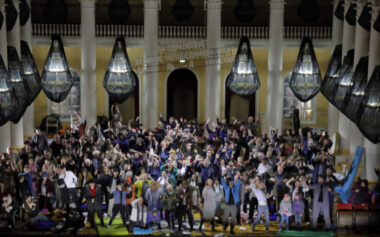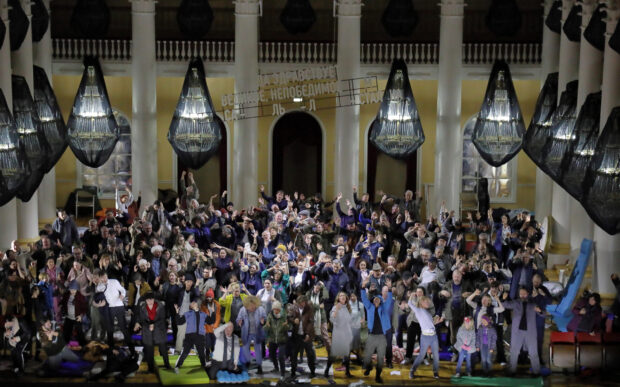 Germany Prokofiev, War and Peace: Soloists, Chorus and Orchestra of Bayerische Staatsoper / Vladimir Jurowski (conductor). Nationaltheater, Munich, 5.3.2023. (ALL)
Germany Prokofiev, War and Peace: Soloists, Chorus and Orchestra of Bayerische Staatsoper / Vladimir Jurowski (conductor). Nationaltheater, Munich, 5.3.2023. (ALL)

This was a risky new production: War and Peace is a monumental opera written in 1942 that contains purely Stalinist propaganda texts, begging the question: is it even appropriate to perform today? With tensions running high in Ukraine, it is difficult to ignore the unsettling parallels between the opera’s text and current events.
Vladimir Jurowski, Dmitri Tcherniakov and Serge Dorny made a concerted effort to address concerns about their production’s relevance. Dorny insisted on a diverse cast featuring artists from both Ukraine and Russia, while Jurowski explained that certain elements had been revised to reflect modern sensibilities. Notably, the scene where Kutuzov orders the burning of Moscow has been removed, and the previously triumphant finale has been reimagined by a grotesque wind band. The premiere of the production on 5 March, seventy years after the death of Prokofiev and Stalin, was undoubtedly a deliberate nod to history.
The production’s most striking aspect is its deliberate distancing effect. Both parts of the opera unfolded in a single setting, the Column Hall of the Moscow House of Trade Unions, where Lenin, Stalin, and Brezhnev’s remains were on display, and where Kutuzov will eventually join them. From the outset, Tcherniakov fills the stage with refugees, among whom the protagonists emerge. It is a bold move that transports the audience out of the era of Napoleon’s wars and into our own time. The first part introduces us to a Russian nobility that all seems to blend together, but the direction of the actors is subtle and faithful to the depth of the characters. Prince Andrei’s awkwardness, his emotional waltz with Natasha, the complexity of his discussions with Pierre Bezukhov, and the ambiguity surrounding his wife’s arrival at the ball are all deftly handled. Familiarity with Tolstoy’s novel is fundamental to fully appreciate the intricacy of the staging.
The second part of the production is even more impressive than the first. The act begins with a striking theatrical moment as the chorus emerges from the darkness. The scene featuring Napoleon is transformed into a farcical parody, designed to amuse and recapture the spirit of Tolstoy’s original work. At this moment, it is hard not to reflect on how today’s Russian government controls the media and narrative, obscuring the reality of what is described as a ‘special operation’ from the Russian people. Nevertheless, the war scenes, Prince Andrei’s death, and Kutuzov’s inspiring speech are all grippingly staged.
Despite the sheer size of the cast, the Bavarian State Opera’s performers are outstanding, as is usually the case. It is difficult to single out individual singers, but some truly shine. Olga Kulchynska brings a refreshing energy to her portrayal of Natasha, while Andrei Zhilikhovsky exudes authority as Prince Andrei. Arsen Soghomonyan delivers a deeply affecting performance as Peter, and Victoria Karkacheva’s voice is simply beautiful as Hélène. Tómas Tómasson was a stunning Napoleon, vocally and theatrically. All smaller roles were well cast, and it was special to have veterans such as Sergei Leiferkus and Violetta Urmana included. Sincere apologies to all those I do not have space to mention. The entire cast was outstanding.
The choral singing was truly remarkable, boasting both power and colour. Vladimir Jurowski led the orchestra with great skill, resulting in a bright, tender, and modern sound. The conductor’s familiarity with the hall and its resources was evident in the impressive quality of the musicians’ performance.
The audience’s reception was enthusiastic, and even Dmitri Tcherniakov appeared taken aback by the level of acclaim, suggesting that such a response may be unusual for him. If you have the opportunity, come to Munich (but you can watch the performance on Arte.tv). Much like the acclaimed production of Shostakovich’s The Nose which kicked off the Dorny-Jurowski era, this is a masterful fusion of current events and artistic expression, resulting in a truly exceptional experience.
Antoine Lévy-Leboyer
Production:
Staging and Stage design – Dmitri Tcherniakov
Costumes – Elena Zaytseva
Lighting design – Gleb Filshtinsky
Assistant Choreographer– Ran Arthur Braun
Conceptual collaboration – Analena Weres
Dramaturgy – Malte Krasting
Chorus director – David Cavelius
Cast:
Prince Andrei Bolkonsky – Andrei Zhilikhovsky
Natasha Rostova – Olga Kulchynska
Sonja – Alexandra Yangel
Host of the New Year’s Eve Ball – Kevin Conners
Lackey of the New Year’s Eve Ball – Alexander Fedin
Marya Dmitriyevna Akhrosimova – Violeta Urmana
Peronskaya – Olga Guryakova
Count Ilya Andreyevich Rostov – Mischa Schelomianski
Count Pierre Besukhov – Arsen Soghomonyan
Countess Hélène Besuchova – Victoria Karkacheva
Anatole Kuragin – Bekhzod Davronov
Lieutenant Dolokhov – Alexei Botnarciuc
An old lackey of the Bolkonskys – Christian Rieger
Parlour maid of the Bolkonskys – Emily Sierra
Valet of the Bolkonskys – Martin Snell
Princess Marya Bolkonskaya – Christina Bock
Prince Nikolai Andreyevich Bolkonsky – Sergei Leiferkus
Balaga – Alexander Roslavets
Matryosha – Oksana Volkova
Dunyasha – Elmira Karakhanova
Gavrila – Roman Chabaranok
Métivier – Stanislav Kuflyuk
French Abbé – Maxim Paster
Denisov – Dmitry Cheblykov
Tikhon Shtcherbatov – Nikita Volkov
Fyodor – Alexander Fedorov
Matveyev – Sergei Leiferkus
Vassilissa – Xenia Vyaznikova
Trischka -Soloist(s) of the Tölzer Knabenchor
Mikhail I. Kutuzov – Dmitry Ulyanov
Kaysarov – Alexander Fedin
1st Staff Officer – Liam Bonthrone
2nd Staff Officer – Csaba Sándor
Napoleon – Tómas Tómasson
Adjutant to General Compans – Alexander Fedorov
Adjutant Murats – Alexandra Yangel
Marshal Bertier – Stanislav Kuflyuk
General Belliard – Bálint Szabó
Adjutant to Prince Eugène – Granite Musliu
Voice behind the scenes – Aleksey Kursanov
Adjutant from Napoleon’s entourage – Thomas Mole
De Beausset – Kevin Conners
Captain Ramballe – Alexander Vassiliev
Lieutenant Bonnet – Aleksey Kursanov
Captain Jacqueau – Csaba Sándor
Gérard – Liam Bonthrone
A young factory worker – Granite Musliu
Shopkeeper – Olga Guryakova
Mavra Kuzminichna – Xenia Vyaznikova
Ivanov – Alexander Fedorov
Marshal Davout – Bálint Szabó
A French officer – Andrew Hamilton
Plato Karataev – Mikhail Gubsky
Two Fools of God – Kevin Conners, Christian Rieger
Two French actresses – Jasmin Delfs, Jessica Niles
